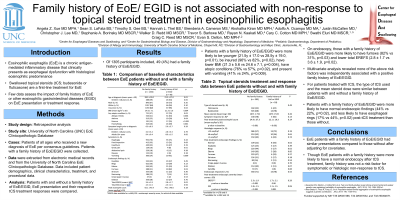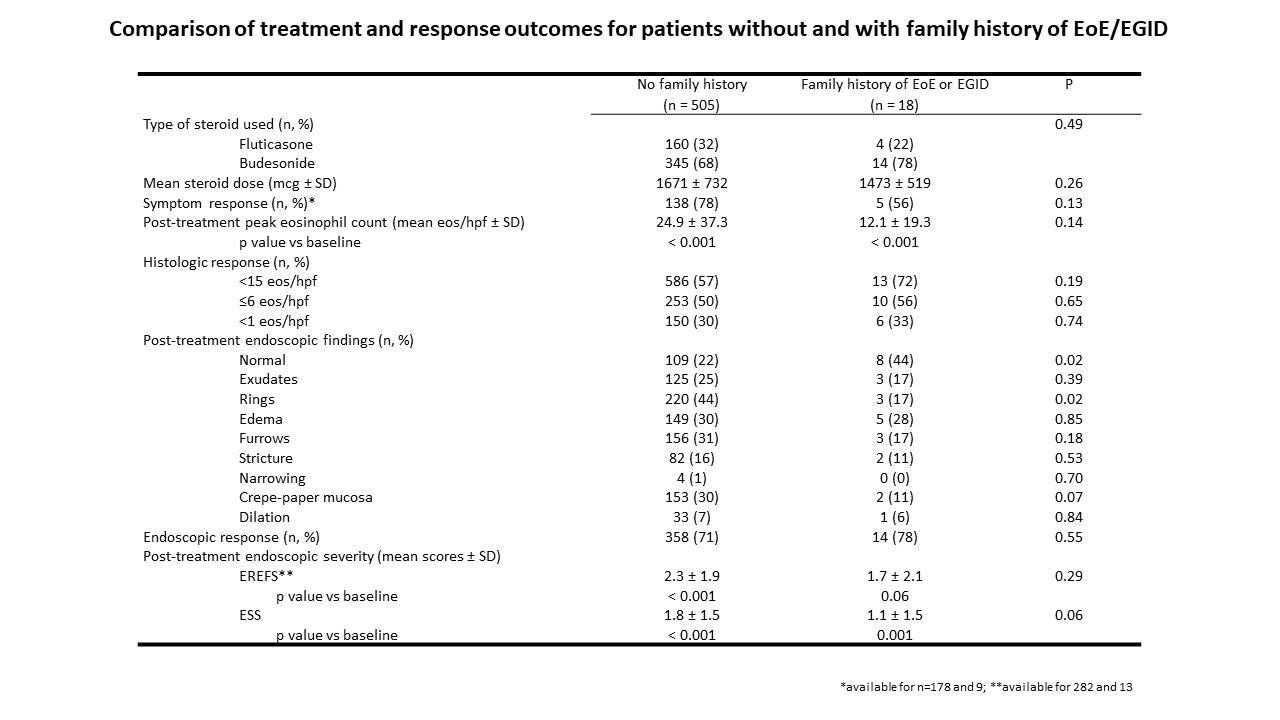Monday Poster Session
Category: Esophagus
P2232 - Family History of Eosinophilic Esophagitis or Other Eosinophilic Gastrointestinal Disease Is Not Associated With Non-Response to Topical Steroid Treatment in Eosinophilic Esophagitis
Monday, October 28, 2024
10:30 AM - 4:00 PM ET
Location: Exhibit Hall E

Has Audio

Angela Z. Xue, MD, MPH
University of North Carolina at Chapel Hill School of Medicine
Chapel Hill, NC
Presenting Author(s)
Angela Z. Xue, MD, MPH1, Sean S. LaFata, BS1, Tim S. Gee, BS1, Hannah L. Thel, BS1, Brenderia A. Cameron, MS1, Akshatha Kiran, MD, MPH2, Adolfo A. Ocampo, MD, MA1, Justin McCallen, MD1, Christopher J. Lee, MD1, Stephanie A. Borinsky, MD, MSCR1, Walker D. Redd, MD1, Trevor Barlowe, MD1, Rayan N. Kaataki, MD1, Cary C. Cotton, MD, MPH1, Swathi Eluri, MD, MSCR3, Craig C. Reed, MD, MSCR1, Evan S.. Dellon, MD, MPH, FACG1
1University of North Carolina at Chapel Hill School of Medicine, Chapel Hill, NC; 2University of North Carolina at Chapel Hill, Chapel Hill, NC; 3Mayo Clinic, Jacksonville, FL
Introduction: Few data assess the impact of family history of EoE or other eosinophilic gastrointestinal diseases (EGID) on EoE presentation or treatment response. We aimed to investigate whether clinical features at diagnosis or topical steroid (tCS) treatment response varies among patients with and without a family history of EoE or other EGID.
Methods: In this retrospective cohort study of, we analyzed patients of any age with a new diagnosis of EoE. Family history of EoE or EGID, demographics, symptom response, and endoscopic findings were extracted from the electronic medical record. For patients who had documented treatment with a tCS and a follow-up endoscopy with biopsy, histologic response was defined as < 15 eos/hpf, with additional assessment of ≤6 and < 1 eos/hpf. Global symptomatic response, endoscopic response, EREFS, and endoscopic severity score (ESS) were also obtained. We compared baseline characteristics and post-tCS treatment response between patients with and without a family history of EoE/EGID.
Results: Of 1305 participants included, 49 (4%) had a family history of EoE/EGID. Patients with a family history of EoE/EGID were more likely to be younger (21.5y ± 17.0 vs 28.5y ± 19.0, p=0.01), be insured (96% vs 82%, p=0.02), have lower BMI (21.3 ± 5.6 vs 24.6 ± 7.1, p=0.004), have atopic conditions (76% vs 57%, p=0.02), and present with vomiting (41% vs 24%, p=0.009). On endoscopy, those with a family history of EoE/EGID were more likely to have furrows (82% vs 31%, p=0.03) and lower total EREFS (2.8 ± 1.7 vs 3.6 ± 1.9, p=0.02). However, multivariate analysis revealed none of the above risk factors was independently associated with a positive family history of EoE/EGID. For patients treated with tCS, the type of tCS used and the mean steroid dose were similar between patients with and without a family history of EoE/EGID (Figure). Patients with a family history of EoE/EGID were more likely to have normal endoscopic findings (44% vs 22%, p=0.02), and less likely to have esophageal rings (17% vs 44%, p=0.02) post-tCS treatment than those without (Figure).
Discussion: EoE patients with a family history of EoE/EGID had similar presentations compared to those without after adjusting for covariates. Though EoE patients with a family history were more likely to have a normal endoscopy after tCS treatment, family history was not a risk factor for symptomatic or histologic non-response to tCS.

Disclosures:
Angela Z. Xue, MD, MPH1, Sean S. LaFata, BS1, Tim S. Gee, BS1, Hannah L. Thel, BS1, Brenderia A. Cameron, MS1, Akshatha Kiran, MD, MPH2, Adolfo A. Ocampo, MD, MA1, Justin McCallen, MD1, Christopher J. Lee, MD1, Stephanie A. Borinsky, MD, MSCR1, Walker D. Redd, MD1, Trevor Barlowe, MD1, Rayan N. Kaataki, MD1, Cary C. Cotton, MD, MPH1, Swathi Eluri, MD, MSCR3, Craig C. Reed, MD, MSCR1, Evan S.. Dellon, MD, MPH, FACG1. P2232 - Family History of Eosinophilic Esophagitis or Other Eosinophilic Gastrointestinal Disease Is Not Associated With Non-Response to Topical Steroid Treatment in Eosinophilic Esophagitis, ACG 2024 Annual Scientific Meeting Abstracts. Philadelphia, PA: American College of Gastroenterology.
1University of North Carolina at Chapel Hill School of Medicine, Chapel Hill, NC; 2University of North Carolina at Chapel Hill, Chapel Hill, NC; 3Mayo Clinic, Jacksonville, FL
Introduction: Few data assess the impact of family history of EoE or other eosinophilic gastrointestinal diseases (EGID) on EoE presentation or treatment response. We aimed to investigate whether clinical features at diagnosis or topical steroid (tCS) treatment response varies among patients with and without a family history of EoE or other EGID.
Methods: In this retrospective cohort study of, we analyzed patients of any age with a new diagnosis of EoE. Family history of EoE or EGID, demographics, symptom response, and endoscopic findings were extracted from the electronic medical record. For patients who had documented treatment with a tCS and a follow-up endoscopy with biopsy, histologic response was defined as < 15 eos/hpf, with additional assessment of ≤6 and < 1 eos/hpf. Global symptomatic response, endoscopic response, EREFS, and endoscopic severity score (ESS) were also obtained. We compared baseline characteristics and post-tCS treatment response between patients with and without a family history of EoE/EGID.
Results: Of 1305 participants included, 49 (4%) had a family history of EoE/EGID. Patients with a family history of EoE/EGID were more likely to be younger (21.5y ± 17.0 vs 28.5y ± 19.0, p=0.01), be insured (96% vs 82%, p=0.02), have lower BMI (21.3 ± 5.6 vs 24.6 ± 7.1, p=0.004), have atopic conditions (76% vs 57%, p=0.02), and present with vomiting (41% vs 24%, p=0.009). On endoscopy, those with a family history of EoE/EGID were more likely to have furrows (82% vs 31%, p=0.03) and lower total EREFS (2.8 ± 1.7 vs 3.6 ± 1.9, p=0.02). However, multivariate analysis revealed none of the above risk factors was independently associated with a positive family history of EoE/EGID. For patients treated with tCS, the type of tCS used and the mean steroid dose were similar between patients with and without a family history of EoE/EGID (Figure). Patients with a family history of EoE/EGID were more likely to have normal endoscopic findings (44% vs 22%, p=0.02), and less likely to have esophageal rings (17% vs 44%, p=0.02) post-tCS treatment than those without (Figure).
Discussion: EoE patients with a family history of EoE/EGID had similar presentations compared to those without after adjusting for covariates. Though EoE patients with a family history were more likely to have a normal endoscopy after tCS treatment, family history was not a risk factor for symptomatic or histologic non-response to tCS.

Figure: Figure
Disclosures:
Angela Xue indicated no relevant financial relationships.
Sean LaFata indicated no relevant financial relationships.
Tim Gee indicated no relevant financial relationships.
Hannah Thel indicated no relevant financial relationships.
Brenderia Cameron indicated no relevant financial relationships.
Akshatha Kiran indicated no relevant financial relationships.
Adolfo Ocampo indicated no relevant financial relationships.
Justin McCallen indicated no relevant financial relationships.
Christopher Lee indicated no relevant financial relationships.
Stephanie Borinsky indicated no relevant financial relationships.
Walker Redd indicated no relevant financial relationships.
Trevor Barlowe indicated no relevant financial relationships.
Rayan Kaataki indicated no relevant financial relationships.
Cary Cotton: Pentax – Grant/Research Support.
Swathi Eluri indicated no relevant financial relationships.
Craig Reed indicated no relevant financial relationships.
Evan Dellon: Abbott – Consultant. AbbVie – Consultant. Adare/Ellodi – Consultant, Grant/Research Support. Aimmune – Consultant. Akesobio – Consultant. Alfasigma – Consultant. ALK – Consultant. Allakos – Consultant, Grant/Research Support. Amgen – Consultant. Aqilion – Consultant, Grant/Research Support. Arena/Pfizer – Consultant, Grant/Research Support. Aslan – Consultant. AstraZeneca – Consultant, Grant/Research Support. Avir – Consultant. Biorasi – Consultant. Calypso – Consultant. Celgene/Receptos/BMS – Consultant, Grant/Research Support. Celldex – Consultant. Dr. Falk Pharma – Consultant. Eli Lilly – Consultant. EsoCap – Consultant. Eupraxia – Consultant, Grant/Research Support. Ferring – Consultant, Grant/Research Support. GlaxoSmithKline – Consultant, Grant/Research Support. Gossamer Bio – Consultant. Holoclara – Consultant. Holoclara – Grant/Research Support. Invea – Consultant. Invea – Grant/Research Support. Knightpoint – Consultant. Landos – Consultant. LucidDx – Consultant. Meritage – Grant/Research Support. Miraca – Grant/Research Support. Morphic – Consultant. Nexstone Immunology/Uniquity – Consultant. Nutricia – Consultant, Grant/Research Support. Parexel/Calyx – Consultant. Phathom – Consultant. Regeneron Pharmaceuticals Inc. – Consultant, Grant/Research Support. Revolo – Consultant, Grant/Research Support. Robarts/Alimentiv – Consultant. Salix – Consultant. Sanofi – Consultant. Shire/Takeda – Consultant, Grant/Research Support. Target RWE – Consultant. Upstream Bio – Consultant.
Angela Z. Xue, MD, MPH1, Sean S. LaFata, BS1, Tim S. Gee, BS1, Hannah L. Thel, BS1, Brenderia A. Cameron, MS1, Akshatha Kiran, MD, MPH2, Adolfo A. Ocampo, MD, MA1, Justin McCallen, MD1, Christopher J. Lee, MD1, Stephanie A. Borinsky, MD, MSCR1, Walker D. Redd, MD1, Trevor Barlowe, MD1, Rayan N. Kaataki, MD1, Cary C. Cotton, MD, MPH1, Swathi Eluri, MD, MSCR3, Craig C. Reed, MD, MSCR1, Evan S.. Dellon, MD, MPH, FACG1. P2232 - Family History of Eosinophilic Esophagitis or Other Eosinophilic Gastrointestinal Disease Is Not Associated With Non-Response to Topical Steroid Treatment in Eosinophilic Esophagitis, ACG 2024 Annual Scientific Meeting Abstracts. Philadelphia, PA: American College of Gastroenterology.
